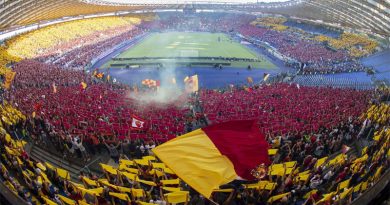Brighton Europa League opponents: AEK Athens
Brighton & Hove Albion’s opponents in the Europa League are some of the biggest names in European football. But how much do we actually know about them?
AEK Athens will make a bit of history as the Seagulls’ first ever opponents in a European competition. Compared to former Champions League winners Marseille and Ajax, they are perhaps the least well know of the three clubs Brighton will face.
They were founded by Greek migrants from Constantinople (now Istanbul) in the 1920s. This is where the name AEK comes from – it stands for Athlitikí Énosis Konstantinoupόleos, meaning Athletic Union of Constantinople.
AEK are one of the three big times in Greek football, alongside Panathinaikos and Olympiakos. Over the years, AEK have won everything domestically and played in both the Champions League and Europa League, as well as the European Cup and UEFA Cup which preceded the current incarnations of the competition.
Their most successful periods came in the 1970s, 1990s and early 2000s. Then followed a decade of financial issues and crowd trouble, after which they were relegated for the first time to the Greek second tier.
To compound a miserable few years, their Nikos Goumas Stadium was demolished in 2003 having been damaged by the 1999 earthquake which hit Athens.
After that period of mismanagement, AEK came under the majority control of a not-for-profit association of fans and former players.
The late 2010s saw AEK return to the Europa League and Champions League and enjoyed further domestic success, despite a rapid turnover in managers.
Included in their list of former head coaches is a certain Gus Poyet. The former Brighton manager took over AEK in 2015 before leaving in controversial circumstances six months later.
As far as I know, he is the only link between the Albion and AEK. Poyet is now in charge of the Greek national team, so will no doubt have a keen interest in Brighton’s visit to Athens on Thursday 30th November.
That game will be held at AEK’s new 32,000 seater Agia Sofia Stadium – known as the OPAP Arena for sponsorship reasons – which they moved into last season.
It is built on the site of the old Nikos Goumas Stadium in the suburb of Nea Filadelfia. It is a little surprising that the capacity of their purpose-built home is virtually the same as the Amex, despite their history, fanbase and status in Greek football.
AEK have a fan organisation known as Original 21 named after the gate of the same number at both their former and current homes.
An Ultras group with a politically left-wing anti-fascist ethos, they have ideological links to a number of supporters groups, including fellow Group B members Marseille.
The emblem of Original 21 is the skull and crossbones and their backing for Palestinian groups has led to violence against supporters of Israeli opponents.
Fans from Israel are not the only opposition supporters AEK have clashed with. In 2019, they were hit with a UEFA ban from competition, a hefty fine and a requirement to hold future games behind closed doors after violence in a match against Ajax, the other team in Group B.
Expect sparks to fly when those two face each other again in Athens and Amsterdam on the same days Brighton take on Marseille.
AEK’s record signing is French right back Djibril Sidibe bought for €8 million in 2022 and their current coach is Argentinian Matías Almayda.
We can expect to see AEK play in their normal kit of plain yellow shirts and black shorts at the OPAP Arena, giving Brighton their only chance to wear the special edition Europa League kit during the group stage. It being white means it cannot be used against either Marseille or Ajax.
Their away colours are all black, which we will see at the Amex on Thursday 21st September should AEK opt to change.
Warren Morgan @WarrenBHAFC




